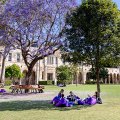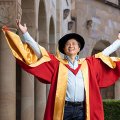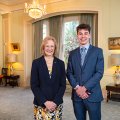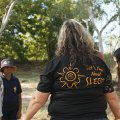
By setting group work and encouraging deep thinking, UQ’s Dr Liz Mackinlay and Dr Katelyn Barney hope to implement reconciliation in a practical way.
The pair, along with their colleagues from the Aboriginal and Torres Strait Islander Studies Unit, have just trialed Problem-Based Learning (PBL) in a first-year Indigenous Australian studies course.
Dr Mackinlay said the pilot study had been a success, with students feeling engaged, asking more questions and choosing to read widely.
PBL – which often involves working in small groups with a lecturer or a tutor who facilitates discussions – helps students “learn how to learn”.
“In many ways PBL group work enables the class to build a community of learners, joined by a shared commitment and desire to know,” Dr Mackinlay said.
“It also creates a space where openness, intellectual rigor and personal transformation can happen.
“There are no right answers in PBL, rather this approach seeks to raise questions in order to allow students to deeply explore, discuss and reflect.”
Students in the course learned the history and ongoing debates around Aboriginal women’s traditional ownership of Hindmarsh Island in South Australia.
The content raised a number of questions about relationships to country, gender and knowledge, and the impact of colonisation and the continued silencing of Aboriginal voices in Australia today.
Dr Barney said the teaching approach was well-suited to Indigenous Australian studies as it mirrored what she and Dr Mackinlay understood about Indigenous methods of knowledge transfer.
“Many students commented that they had gained a deeper understanding of disjunction between Western judicial systems and Indigenous knowledge systems and also made them aware that not all Aboriginal women agreed,” she said.
“In the Indigenous Australian studies classroom, there are occasions where students generate questions that the lecturer cannot answer.
“This in turn begins another cycle of reflection-action-reflection as both students and teachers enter into a dialogue together to find what it is that needs to be learnt and to better understand what is problematic about a situation.
“The approach helped them to think critically and deeply about complex issues rather than surface learning, assisted them to ask questions and more questions, and to critically reflect on their learning and engage with their peers.”
The project is funded through a $220,000 grant from the Australian Learning and Teaching Council.
It aims to evaluate whether Problem-Based Learning can transform tertiary education as a pathway to social justice and empowerment for Aboriginal and Torres Strait Islander peoples.
The next step involves expanding the project across four other Australian universities using the results of the UQ pilot study.
Dr Barney will assist project team members to collect data from one course which uses Problem-Based Learning at Monash University; Charles Darwin University; University of Newcastle; and University of Technology Sydney.
Media: Dr Katelyn Barney (07 3365 1969, k.barney@uq.edu.au) or Penny Robinson at UQ Communications (07 3365 9723, penny.robinson@uq.edu.au)

.jpg?itok=A3VEKM1Y)










